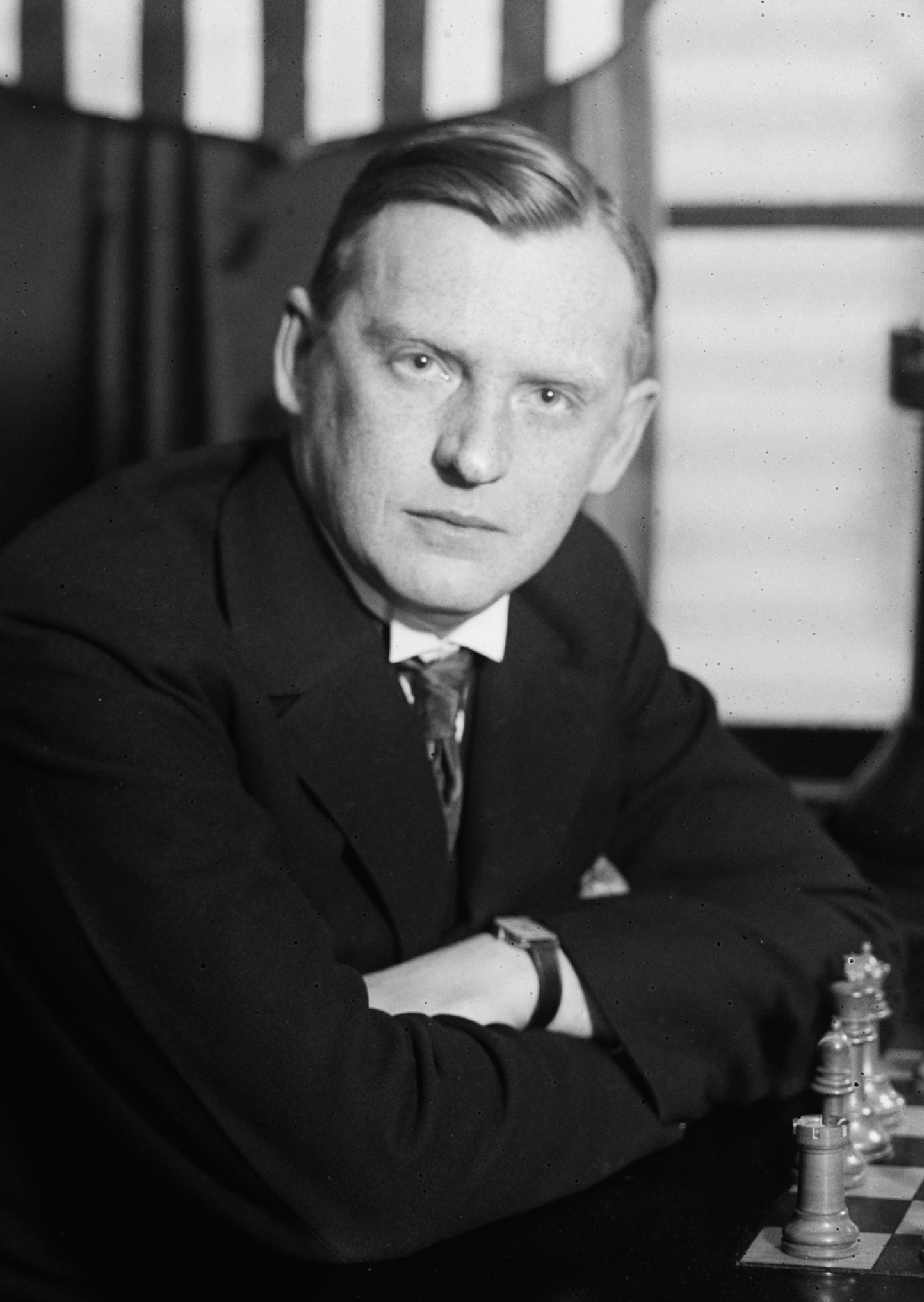Ex Chandlers Ford Chess Club (under their previous names) player Kev Byard has produced an article following a discussion on a mate seen in a recent online game by Keven Lamb, which took him (Byard) back to the late 1970’s when he was a teenager.
Photograph: By George Grantham Bain Collection (Library of Congress).
Alekhine vs Stockfish – Kevin Byard
Following a note by Kev Lamb, whereby he reported an interesting mate he saw recently in a game where the Caro-Kann was played, I recalled a mention of a similar mate in the same opening in an old book. That book is ‘My Best Games of Chess 1924-1937’ by the great former world champion Alexander Alekhine. Kev’s note made me sufficiently interested to retrieve said book from my damp and dusty basement. Sure enough, the mate was there (p. 35, 8.Nd6 mate, for those interested – I can give more details if you contact me). However, this article does not deal with that particular mate. Instead, I am writing about a very interesting modern day phenomenon that I noticed when looking at the book over again.
Upon retrieval of the dusty, decaying and flea-bitten book, I was transported back to the late ‘70’s when I first played through the games within and, as a teenager, recalled my being awestruck by Alekhine’s analyses. Indeed, a very strong player for Burton Chess Club said that if I were to look closely at the games and analyses in Alekhine’s book, he would ‘guarantee’ that it would improve my chess. That may have been true. However, my opinion of the greatness of the great man’s work has since changed a little and I can report that the former world champion was actually quite fallible. Yes, I know he would have whipped my arse over the board, but if someone is going to write a book about his games and sell it (a book which I among many actually paid good money for) then it should be close to watertight, in my opinion.
Upon this second reading of Alekhine’s volume, I thought it would be interesting to play through some of the games and let Stockfish (SF) have a look at them. Although I’ve only gone through a handful of games in this manner, I have been amazed at the number of times that SF disagreed with Alekhine and rated his moves as not only NOT the best, but often not the 2nd best or even the 3rd best. And there are even major holes in the great man’s analyses.
While there are many games in Alekhine’s volume, for this article I have chosen to focus on just one game. The reason I chose this game is because it was awarded a brilliancy prize and so I was expecting near-perfect play and analysis from Alekhine as the winner. However I was fascinated by my findings from SF. The game in question is Alekhine-Asztalos Kecskemet, July 1927 (p.33 of the dusty volume). The opponent, Lajos Asztalos, though a highly consummate player, was no real match for Alekhine and so the result might have been viewed as somewhat of a foregone conclusion. That said (also see above) Asztalos also would have whipped my arse over the board.
I entered the moves of the game into SF and the comparison of Alekhine’s analysis in his book vs that of SF is really interesting. Most of the comments I make below occur when Alekhine makes his own comment and/or when he includes a ! or !! after a move.
White: Alekhine, Black: Asztalos. The game is on Stockfish, via the link below. For those who don’t wish to play through the entire game, fast forward to move 42 where Black resigned and where the most interesting things happen.
https://lichess.org/study/vhWGFXWH
Now, it could be possible that SF does not actually find the very best moves and that Alekhine was indeed better than this machine. However, I have my doubts about that, especially with Alekhine’s final comments about the supposed win of a rook.
Perhaps I’m being uncharitable about Alekhine. Firstly, computers weren’t around in those days and I acknowledge that to compose a book with exhaustive analysis is prohibitively hard. Secondly I haven’t yet put games of other GMs into SF (Fischer’s 60 Memorable Games springs to mind) so maybe all the other GMs are equally as fallible as Alekhine. Thirdly, any GM these days who does decide to write a ‘Best Games/Memorable Games’ volume has machine help to enhance their prospective book.
Acknowledgements and sources:
- Photograph: By George Grantham Bain Collection (Library of Congress) – This image is available from the United States Library of Congress’s Prints and Photographs division under the digital ID ggbain.36943. https://commons.wikimedia.org/w/index.php?curid=6661574
